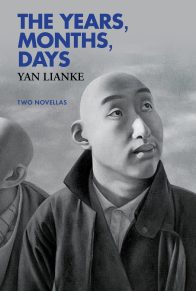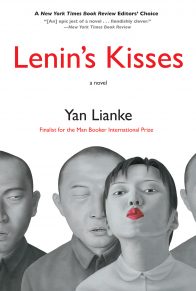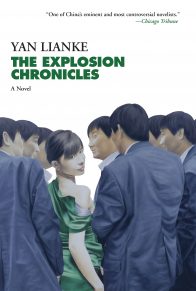The novel is the only place for a great many of life’s truths. Because it is only in fiction that certain facts can be held up to the light.
The novel it is, then, for this particular truth.
The story I’m about to tell, you see, bears some resemblance to real characters and events.
Or—if I may put it this way: life has imitated art, re-rehearsing the plot of Serve the People!
Wu Dawang, Sergeant of the Catering Squad, now General Orderly for the Division Commander and his wife, stood in the doorway to the kitchen, a bunch of pak choi in hand, acknowledging a devastating new presence in the room. The wooden sign ordering its beholder, in bright red letters, to “Serve the People!” had moved from its usual place on the dining table and on to the kitchen work top. To the left of the exhortation, five stars gleamed; to the right, a water canteen dangled from a rifle while a luxuriant row of wheat bristled beneath.
The pride of the entire division, an exemplar, a model of political correctness, the Sergeant enjoyed an extraordinarily well-developed understanding of the sign’s symbolic language. The five stars (the Revolution) together with the rifle and canteen (the Party’s history of armed struggle) were reminders of the long, arduous path to Revolution. The wheat pointed to the glorious future: of glorious harvests in the glorious times to come once Communism had been realized.
This sign, its letters burning scarlet against a whitewashed background, its stars, rifle, canteen and wheat emblazoned in red and yellow, had come home one day with the Division Commander. He had gazed solemnly at Wu Dawang as he laid it on the table. “Do you know what this sign means?” he asked, while his General Orderly set down dishes of food before him.
After a long, hard look, Wu Dawang produced a careful critique.
“Good,” declared the Commander, his face brightening slowly into a smile. “Very good, in fact—much better than them.”
Though Wu Dawang didn’t know who the Division Commander meant by “them,” he did know, and better than most, the People’s Liberation Army’s three rules of thumb—Don’t Say What You Shouldn’t Say, Don’t Ask What You Shouldn’t Ask, Don’t Do What You Shouldn’t Do. He therefore went back to the kitchen to prepare soup for the Commander and his wife. And from that moment on, the sign became the most distinguished, most illustrious resident of the dining table, casting its mighty symbolic shadow over the lowly bottles of vinegar, chilli sauce and sesame oil.
The days passed, one after another, as time trickled peacefully, indeterminately through the barracks. Every day at dawn, before reveille, the Commander would come downstairs, immaculately uniformed, and set out for the parade ground—for his daily round of drills, and yet more drills. Every night, long after lights-out, he would return home exhausted, take off his uniform, wash his face, brush his teeth and climb upstairs to bed. Revolution and work were the epicentre of the Commander’s life, dominating his entire being. Since earliest boyhood, he had held up the Great Events in Our Nation’s History—the Sino-Japanese War, Land Reform, the Fight for Liberation—as a yardstick against which to measure the significance of his every day of existence. Even now, on the wrong side of fifty and gazing down the slope to old age, he still relied on the same gauge to calibrate the meaning of his life.
His young, pretty wife Liu Lian, by contrast, led a much less meaningful life. A nurse by training, and seventeen or eighteen years his junior, she hadn’t set foot in a hospital since her marriage. No one knew whether she’d given up work voluntarily, or because her husband had wanted her to, but for a full five years now she had stayed at home, ruling this senior officer’s roost, keeping company only with the four walls around her and the prestige of their master.
Of Liu Lian, Wu Dawang knew next to nothing. Before he’d taken up his present post, he’d known nothing at all. He had no idea where she’d grown up or when she’d joined the army as a nurse. He didn’t know she hadn’t worked for five years or, apart from mealtimes, what she did upstairs all day. He didn’t know whether the army still paid her salary even though she didn’t turn up to work; whether she was from a military family; whether she’d forgotten army protocol in the years she’d been out of uniform. To him, her personal history was a gigantic blank, a mountain range shrouded in impenetrable mist. Beneath the blankets of cloud, the peaks might have been desolate crags emerging from ravines, or carpets of green serenaded by songbirds and festooned with gorgeous flowers and gurgling brooks; but Wu Dawang had no way of telling.
Because these were matters of which he knew nothing, he paid them no attention; and because he paid them no attention, the Division Commander delighted in his choice of orderly. Even though Wu Dawang was a veteran revolutionary of several years’ service, even though his personal file was piled vertiginously high with honours, despite all his commendations, awards and citations, despite the fact that twice a year the brigade’s Head of Management would name him Model Soldier as unhesitatingly as one would hand a narcoleptic a pillow, still he wanted more—much, much more. Wu Dawang was, in short, a man greedy for laurels, an exceptional soldier fixated on promotion. And it was after one particularly exhilarating performance at a Mass Theory and Practice of Frontline Logistics Competition—in which Wu had recited, word-perfect, 286 quotations and three classic essays (“Serve the People,” “Commemorating Norman Bethune,” and “The Foolish Old Man who Moved the Mountains”) by Chairman Mao; had dug a stove, chopped ingredients and presented an immaculate gourmet banquet of four dishes and a soup all within thirty minutes; and had, yet again, been lauded up and down the barracks ranks as Model Soldier—that the Division Commander had selected him as his full-time orderly and cook.
“What is it you must always remember,” the Head of Management had asked, “when you start work for the Commander?”
“Don’t ask what I shouldn’t ask, don’t do what I shouldn’t do, don’t say what I shouldn’t say,” he replied.
“And?”
“To serve the Division Commander is to Serve the People.”
“More important even than that,” the Head of Management added, “you must mean what you say, unite theory with practice, and make sure your actions speak as loud as your words.”
“Please reassure the Commander that I will speak as I think, and act as I speak, that I will be both Red and Expert.”
“Excellent,” the Head of Management said. “Off you go then, and I’m sure more accolades will come your way soon.”
And with that, Wu Dawang was transferred to the Division Commander’s own household.
For the past six months, he had stuck cautiously, conscientiously, scrupulously to his brief: he had cooked, grown vegetables, kept the floor and the front yard spotless, tended the herbaceous borders and pruned the trees regularly. After a short spell of home leave, he’d barely left his new place of work—Number One in the senior officers’ compound—this whole time. Because of Wu Dawang’s tireless dedication to duty, and because of the Division Commander’s almost obsessive zeal for the tasks of the Revolution and of the Party, during a recent, centrally orchestrated Streamline-and-Regroup Initiative, the Commander had set an example for everyone by cutting his own household staff to one. This meant that now only two people were left rattling around this Soviet-built military residence once the Commander had gone to work each morning: Liu Lian, the Commander’s thirty-two-year-old wife, and Wu Dawang, his twenty-eight-year-old General Orderly—like a single rose and a hoe left abandoned in a vast, bare flower bed.
As to how the whole thing began, Wu Dawang had no idea. He was unaware how many times in the last six months the Commander’s wife had looked him over at the dinner table. Or how she had stood at the window, never taking her eyes off him, as he hoed the vegetable patch at the back of the house. He didn’t know that, while he’d been pinning back the grapes in the front yard, she’d found herself compelled to draw him closer, magnifying his image through the Commander’s telescope, because the vines—as densely fruitful as a Marxist-Leninist-Maoist study meeting—were obscuring her quarry. Over the days and months, she had studied him. Just as a jeweller would scrutinize a diamond or a chunk of agate through an eyeglass, she studied the pearls of sweat on his forehead; like a connoisseur appreciating a piece of rare, purple-threaded jade, she perused the veins in his neck and along his bronzed shoulders. But he—just as a wild pagoda tree is oblivious to the scent of a garden-bound peony—remained insensible, unknowing. Beyond the Division Commander’s gated compound, time passed as unstoppably as water flows to the east and the sun sinks in the west. Outside, the furnaces of the Revolution raged, the great rivers rolled and billowed, but within—within, all remained as peaceful as a valley of fragrant peach blossom, of gentle streams and lush, undulating hills, swaddled in a poetic mist of desire.
It was against this idyllic backdrop that, three days ago, as dusk was falling on whichever secret meeting had been scheduled for the second day of the Commander’s all-important two-month study-and-discussion conference on streamlining army administration and performance in Beijing, after Wu Dawang had taken dinner with Liu Lian and begun clearing the table, she had sent in his direction a glance beneath whose coolly decorous exterior burned a seething fire. Taking the Serve the People! sign from its place against the wall, she set it down on the mahogany dining table—as lightly, nonchalantly and guilelessly as if she were asking him to fetch something from the yard, or pick something up from the floor.
“Xiao Wu,” she said, tucking the diminutive xiao in front of his surname in a casual, blandly affectionate kind of way, “whenever this sign’s not in its usual place, it means I need you upstairs for something.”
Her communication concluded, she knocked the wooden sign meaningfully against the table—a cool, darkly enigmatic sound, like that of jade on agate. Then, just as she did after every meal, she glided sedately up the stairs.
He stood there, dazed, not sure what was next expected of him, a hint of pleasurable disquiet percolating through him. He gazed at her retreating figure as if it belonged to a woman he’d never seen before, following it with his eyes until she turned the bend in the stairs and her shadow disappeared like a tree’s evaporating at sundown. He then returned the sign to its proper place, and set about his usual washing of the dishes and other richly revolutionary chores around the house.















